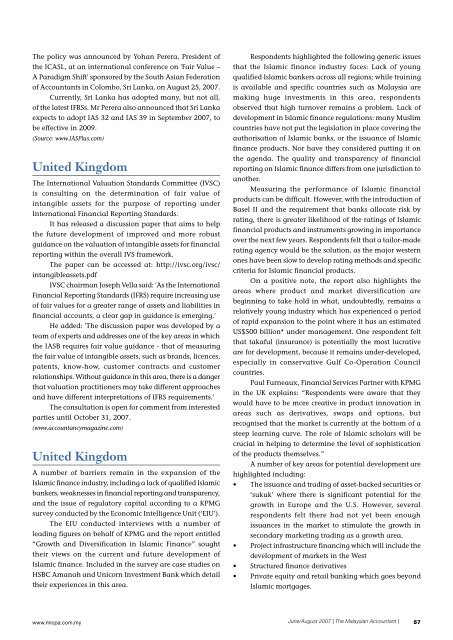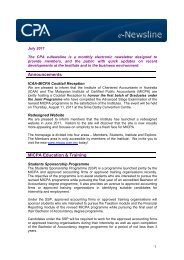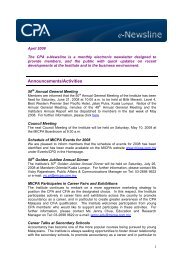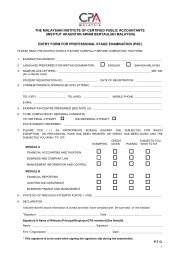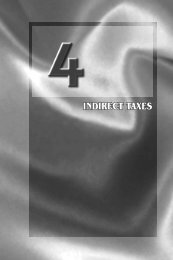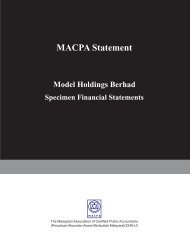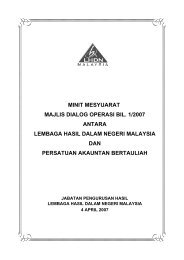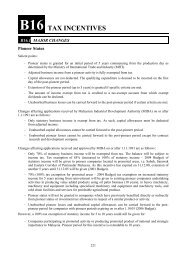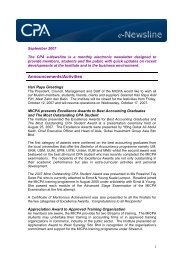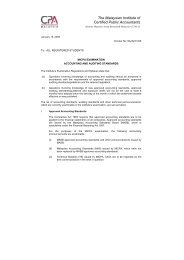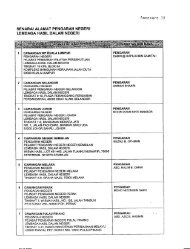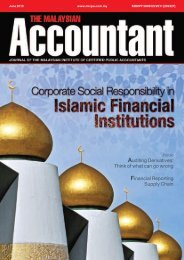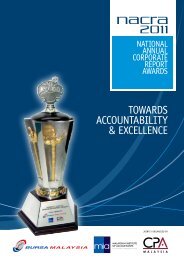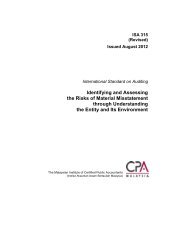The Malaysian Accountant - The Malaysian Institute Of Certified ...
The Malaysian Accountant - The Malaysian Institute Of Certified ...
The Malaysian Accountant - The Malaysian Institute Of Certified ...
Create successful ePaper yourself
Turn your PDF publications into a flip-book with our unique Google optimized e-Paper software.
<strong>The</strong> policy was announced by Yohan Perera, President ofthe ICASL, at an international conference on 'Fair Value –A Paradigm Shift' sponsored by the South Asian Federationof <strong>Accountant</strong>s in Colombo, Sri Lanka, on August 25, 2007.Currently, Sri Lanka has adopted many, but not all,of the latest IFRSs. Mr Perera also announced that Sri Lankaexpects to adopt IAS 32 and IAS 39 in September 2007, tobe effective in 2009.(Source: www.IASPlus.com)United Kingdom<strong>The</strong> International Valuation Standards Committee (IVSC)is consulting on the determination of fair value ofintangible assets for the purpose of reporting underInternational Financial Reporting Standards.It has released a discussion paper that aims to helpthe future development of improved and more robustguidance on the valuation of intangible assets for financialreporting within the overall IVS framework.<strong>The</strong> paper can be accessed at: http://ivsc.org/ivsc/intangibleassets.pdfIVSC chairman Joseph Vella said: 'As the InternationalFinancial Reporting Standards (IFRS) require increasing useof fair values for a greater range of assets and liabilities infinancial accounts, a clear gap in guidance is emerging.'He added: '<strong>The</strong> discussion paper was developed by ateam of experts and addresses one of the key areas in whichthe IASB requires fair value guidance - that of measuringthe fair value of intangible assets, such as brands, licences,patents, know-how, customer contracts and customerrelationships. Without guidance in this area, there is a dangerthat valuation practitioners may take different approachesand have different interpretations of IFRS requirements.'<strong>The</strong> consultation is open for comment from interestedparties until October 31, 2007.(www.accountancymagazine.com)United KingdomA number of barriers remain in the expansion of theIslamic finance industry, including a lack of qualified Islamicbankers, weaknesses in financial reporting and transparency,and the issue of regulatory capital according to a KPMGsurvey conducted by the Economic Intelligence Unit (‘EIU’).<strong>The</strong> EIU conducted interviews with a number ofleading figures on behalf of KPMG and the report entitled“Growth and Diversification in Islamic Finance” soughttheir views on the current and future development ofIslamic finance. Included in the survey are case studies onHSBC Amanah and Unicorn Investment Bank which detailtheir experiences in this area.Respondents highlighted the following generic issuesthat the Islamic finance industry faces: Lack of youngqualified Islamic bankers across all regions; while trainingis available and specific countries such as Malaysia aremaking huge investments in this area, respondentsobserved that high turnover remains a problem. Lack ofdevelopment in Islamic finance regulations: many Muslimcountries have not put the legislation in place covering theauthorisation of Islamic banks, or the issuance of Islamicfinance products. Nor have they considered putting it onthe agenda. <strong>The</strong> quality and transparency of financialreporting on Islamic finance differs from one jurisdiction toanother.Measuring the performance of Islamic financialproducts can be difficult. However, with the introduction ofBasel II and the requirement that banks allocate risk byrating, there is greater likelihood of the ratings of Islamicfinancial products and instruments growing in importanceover the next few years. Respondents felt that a tailor-maderating agency would be the solution, as the major westernones have been slow to develop rating methods and specificcriteria for Islamic financial products.On a positive note, the report also highlights theareas where product and market diversification arebeginning to take hold in what, undoubtedly, remains arelatively young industry which has experienced a periodof rapid expansion to the point where it has an estimatedUS$500 billion* under management. One respondent feltthat takaful (insurance) is potentially the most lucrativeare for development, because it remains under-developed,especially in conservative Gulf Co-Operation Councilcountries.Paul Furneaux, Financial Services Partner with KPMGin the UK explains: “Respondents were aware that theywould have to be more creative in product innovation inareas such as derivatives, swaps and options, butrecognised that the market is currently at the bottom of asteep learning curve. <strong>The</strong> role of Islamic scholars will becrucial in helping to determine the level of sophisticationof the products themselves.”A number of key areas for potential development arehighlighted including:• <strong>The</strong> issuance and trading of asset-backed securities or‘sukuk’ where there is significant potential for thegrowth in Europe and the U.S. However, severalrespondents felt there had not yet been enoughissuances in the market to stimulate the growth insecondary marketing trading as a growth area.• Project infrastructure financing which will include thedevelopment of markets in the West• Structured finance derivatives• Private equity and retail banking which goes beyondIslamic mortgages.www.micpa.com.myJune/August 2007 | <strong>The</strong> <strong>Malaysian</strong> <strong>Accountant</strong> |57


